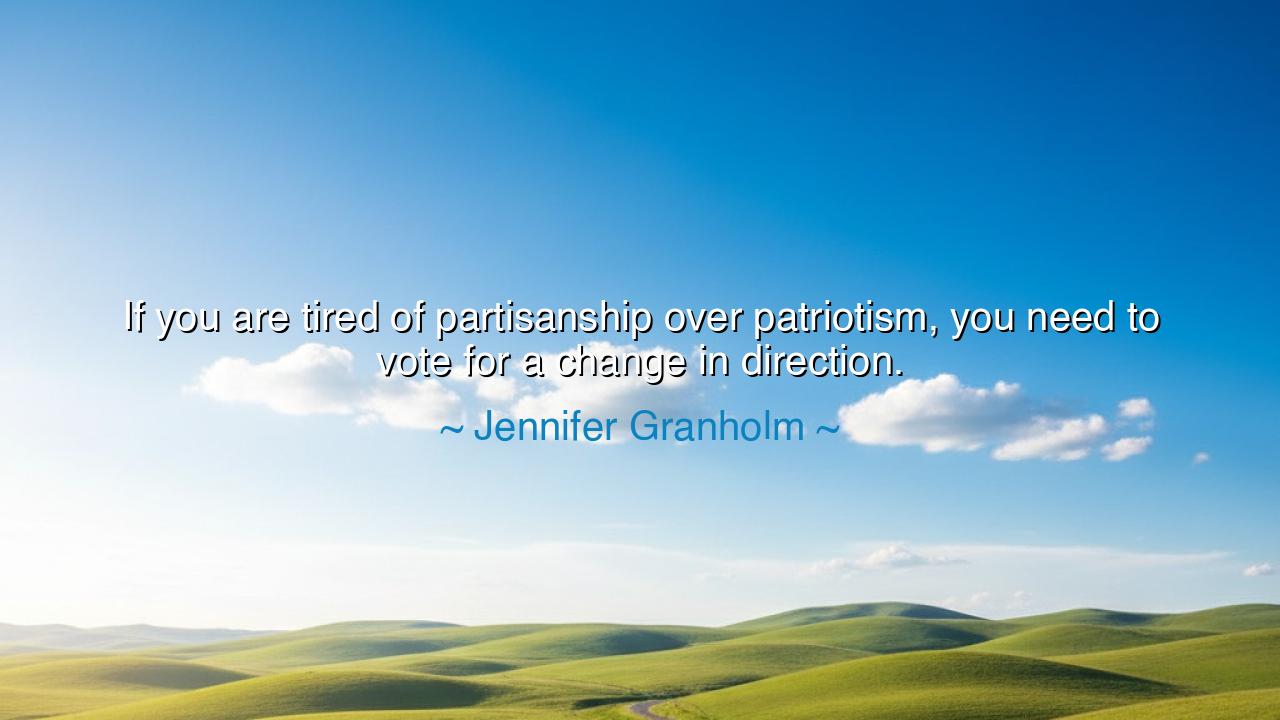
If you are tired of partisanship over patriotism, you need to
If you are tired of partisanship over patriotism, you need to vote for a change in direction.






The words of Jennifer Granholm—“If you are tired of partisanship over patriotism, you need to vote for a change in direction.”—strike with the urgency of a bell tolling in the night. She names the great sickness of our age: when partisanship—the narrow loyalty to party and faction—overshadows patriotism, the higher loyalty to nation and people. Her call is both a lament and a summons, reminding us that when division consumes unity, when political tribes matter more than the common good, then a nation loses its soul. The cure, she insists, lies in action: the act of choosing leaders who embody devotion to country above devotion to faction.
At the heart of her teaching lies a truth as old as republics: partisanship is natural, for human beings gather in groups, form alliances, and struggle for power. Yet when it grows unchecked, it becomes poison. Parties turn into enemies, debate turns into war, and truth is sacrificed to victory. But patriotism rises above these quarrels. It is the devotion to the whole, the recognition that while parties may contend, the nation must endure. To prefer patriotism over partisanship is to remember that we are not merely Republicans or Democrats, conservatives or liberals, but citizens first.
History gives us sharp examples of this struggle. In the early years of the American Republic, the rivalry between Jefferson’s Democratic-Republicans and Hamilton’s Federalists grew fierce, nearly tearing the young nation apart. Yet when Thomas Jefferson took office in 1801, he spoke the words that healed division: “We are all Republicans, we are all Federalists.” In that moment, Jefferson placed patriotism above partisanship, reminding citizens that parties are tools, not masters, and that the republic belongs to all. Without such wisdom, the fragile experiment in democracy might have shattered before it had begun.
Granholm’s words also echo in the modern age. Too often, decisions are made not for the good of the people, but to weaken the opposing side. Progress is halted, not because it is unwise, but because it comes from a rival. This is partisanship over patriotism—a blindness that sacrifices the health of the nation for the pride of the party. The antidote is not despair, but the ballot: the power of the people to demand leaders who place country first, who seek common ground, and who honor service above self-interest.
The ancients knew this wisdom as well. In Athens, partisanship destroyed democracy when rival factions pursued their own glory at the expense of unity, paving the way for tyranny. In Rome, the endless battles between patricians and plebeians weakened the Republic until it collapsed into empire. These lessons whisper through Granholm’s words: when partisanship dominates, liberty dies. But when citizens demand leaders of patriotism, republics endure.
The lesson for us is clear: we must not grow weary, nor let cynicism paralyze us. If we are tired of quarrels that tear the nation apart, if we long for unity over division, then we must act. Voting is not a small thing—it is the way a people reshapes its destiny. Each ballot cast for leaders of principle is a stone laid in the foundation of renewal. To refuse this responsibility is to surrender to decay; to embrace it is to summon the future.
In daily life, this means seeking not only leaders but also neighbors who put country over faction. It means practicing patriotism by listening across divides, by working together for common good, and by resisting the easy lure of hatred. Each citizen must decide whether to deepen the wounds of division, or to heal them with the balm of loyalty to the whole.
Thus let Granholm’s words echo like a command: if you are tired of partisanship over patriotism, change direction. Do not accept leaders who fan division; choose those who unite. Do not honor those who serve a party above a people; honor those who serve a nation above themselves. For in this lies the survival of republics, the flourishing of peoples, and the hope of generations yet to come.






AAdministratorAdministrator
Welcome, honored guests. Please leave a comment, we will respond soon